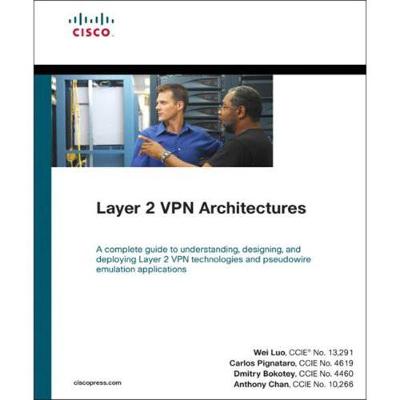Networking Technology
1 total work
Layer 2 VPN Architectures (paperback)
by Wei Luo, Carlos Pignataro, Anthony Chan, and Dmitry Bokotey
Published 1 January 2005
A complete guide to understanding, designing, and deploying Layer 2 VPN technologies and pseudowire emulation applications
Evaluate market drivers for Layer 2 VPNs
Understand the architectural frame-work and choices for Layer 2 VPNs, including AToM and L2TPv3
Grasp the essentials of Layer 2 LAN and WAN technologies
Examine the theoretical and operational details of MPLS and LDP as they pertain to AToM
Understand the theoretical and operational details of Layer 2 protocols over L2TPv3 in IP networks
Learn about Layer 2 VPN bridged and routed interworking and Layer 2 local switching
Understand the operation and application of Virtual Private LAN Services (VPLS)
Learn about foundation and advanced AToM and L2TPv3 topics through an extensive collection of case studies
The historical disconnect between legacy Layer 2 and Layer 3 VPN solutions has forced service providers to build, operate, and maintain separate infrastructures to accommodate various VPN access technologies. This costly proposition, however, is no longer necessary. As part of its new Unified VPN Suite, Cisco Systems® now offers next-generation Layer 2 VPN services like Layer 2 Tunneling Protocol version 3 (L2TPv3) and Any Transport over MPLS (AToM) that enable service providers to offer Frame Relay, ATM, Ethernet, and leased-line services over a common IP/MPLS core network. By unifying multiple network layers and providing an integrated set of software services and management tools over this infrastructure, the Cisco® Layer 2 VPN solution enables established carriers, IP-oriented ISP/CLECs, and large enterprise customers (LECs) to reach a broader set of potential VPN customers and offer truly global VPNs.
Layer 2 VPN Architectures is a comprehensive guide to consolidating network infrastructures and extending VPN services. The book opens by discussing Layer 2 VPN applications utilizing both AToM and L2TPv3 protocols and comparing Layer 3 versus Layer 2 provider-provisioned VPNs. In addition to describing the concepts related to Layer 2 VPNs, this book provides an extensive collection of case studies that show you how these technologies and architectures work. The case studies include both AToM and L2TPv3 and reveal real-world service provider and enterprise design problems and solutions with hands-on configuration examples and implementation details. The case studies include all Layer 2 technologies transported using AToM and L2TPv3 pseudowires, including Ethernet, Ethernet VLAN, HDLC, PPP, Frame Relay, ATM AAL5 and ATM cells, and advanced topics relevant to Layer 2 VPN deployment, such as QoS and scalability.
Evaluate market drivers for Layer 2 VPNs
Understand the architectural frame-work and choices for Layer 2 VPNs, including AToM and L2TPv3
Grasp the essentials of Layer 2 LAN and WAN technologies
Examine the theoretical and operational details of MPLS and LDP as they pertain to AToM
Understand the theoretical and operational details of Layer 2 protocols over L2TPv3 in IP networks
Learn about Layer 2 VPN bridged and routed interworking and Layer 2 local switching
Understand the operation and application of Virtual Private LAN Services (VPLS)
Learn about foundation and advanced AToM and L2TPv3 topics through an extensive collection of case studies
The historical disconnect between legacy Layer 2 and Layer 3 VPN solutions has forced service providers to build, operate, and maintain separate infrastructures to accommodate various VPN access technologies. This costly proposition, however, is no longer necessary. As part of its new Unified VPN Suite, Cisco Systems® now offers next-generation Layer 2 VPN services like Layer 2 Tunneling Protocol version 3 (L2TPv3) and Any Transport over MPLS (AToM) that enable service providers to offer Frame Relay, ATM, Ethernet, and leased-line services over a common IP/MPLS core network. By unifying multiple network layers and providing an integrated set of software services and management tools over this infrastructure, the Cisco® Layer 2 VPN solution enables established carriers, IP-oriented ISP/CLECs, and large enterprise customers (LECs) to reach a broader set of potential VPN customers and offer truly global VPNs.
Layer 2 VPN Architectures is a comprehensive guide to consolidating network infrastructures and extending VPN services. The book opens by discussing Layer 2 VPN applications utilizing both AToM and L2TPv3 protocols and comparing Layer 3 versus Layer 2 provider-provisioned VPNs. In addition to describing the concepts related to Layer 2 VPNs, this book provides an extensive collection of case studies that show you how these technologies and architectures work. The case studies include both AToM and L2TPv3 and reveal real-world service provider and enterprise design problems and solutions with hands-on configuration examples and implementation details. The case studies include all Layer 2 technologies transported using AToM and L2TPv3 pseudowires, including Ethernet, Ethernet VLAN, HDLC, PPP, Frame Relay, ATM AAL5 and ATM cells, and advanced topics relevant to Layer 2 VPN deployment, such as QoS and scalability.
